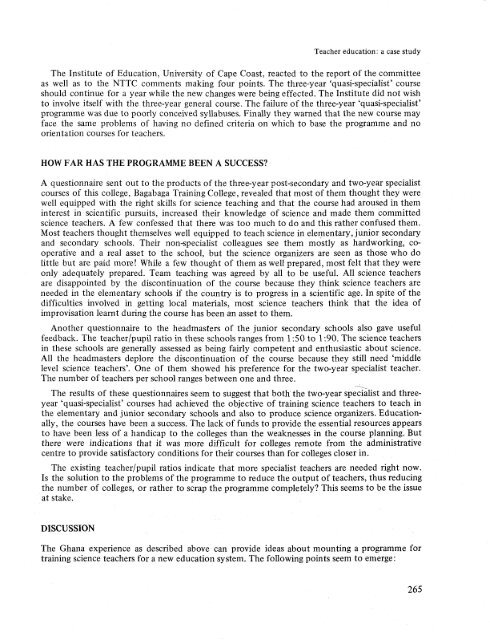New trends in physics teaching, v.4; The ... - unesdoc - Unesco
New trends in physics teaching, v.4; The ... - unesdoc - Unesco
New trends in physics teaching, v.4; The ... - unesdoc - Unesco
You also want an ePaper? Increase the reach of your titles
YUMPU automatically turns print PDFs into web optimized ePapers that Google loves.
Teacher education: a case study<br />
<strong>The</strong> Institute of Education, University of Cape Coast, reacted to the report of the committee<br />
as well as to the NTTC comments mak<strong>in</strong>g four po<strong>in</strong>ts. <strong>The</strong> three-year ‘quasi-specialist’ course<br />
should cont<strong>in</strong>ue for a year while the new changes were be<strong>in</strong>g effected. <strong>The</strong> Institute did not wish<br />
to <strong>in</strong>volve itself with the three-year general course. <strong>The</strong> failure of the three-year ‘quasi-specialist’<br />
programme was due to poorly conceived syllabuses. F<strong>in</strong>ally they warned that the new course may<br />
face the same problems of hav<strong>in</strong>g no def<strong>in</strong>ed criteria on which to base the programme and no<br />
orientation courses for teachers.<br />
HOW FAR HAS THE PROGRAMME BEEN A SUCCESS?<br />
A questionnaire sent out to the products of the three-year post-secondary and two-year specialist<br />
courses of this college, Bagabaga Tra<strong>in</strong><strong>in</strong>g College, revealed that most of them thought they were<br />
well equipped with the right skills for science teach<strong>in</strong>g and that the course had aroused <strong>in</strong> them<br />
<strong>in</strong>terest <strong>in</strong> scientific pursuits, <strong>in</strong>creased their knowledge of science and made them committed<br />
science teachers. A few confessed that there was too much to do and this rather confused them.<br />
Most teachers thought themselves well equipped to teach science <strong>in</strong> elementary, junior secondary<br />
and secondary schools. <strong>The</strong>ir non-specialist colleagues see them mo’stly as hardwork<strong>in</strong>g, cooperative<br />
and a real asset to the school, but the science organizers are seen as those who do<br />
little but are paid more! While a few thought of them as well prepared, most felt that they were<br />
only adequately prepared. Team teach<strong>in</strong>g was agreed by all to be useful. All science teachers<br />
are disappo<strong>in</strong>ted by the discont<strong>in</strong>uation of the course because they th<strong>in</strong>k science teachers are<br />
needed <strong>in</strong> the elementary schools if the country is to progress <strong>in</strong> a scientific age. In spite of the<br />
difficulties <strong>in</strong>volved <strong>in</strong> gett<strong>in</strong>g local materials, most science teachers th<strong>in</strong>k that the idea of<br />
improvisation learnt dur<strong>in</strong>g the course has been an asset to them.<br />
Another questionnaire to the headmasters of the junior secondary schools also gave useful<br />
feedback. <strong>The</strong> teacher/pupil ratio <strong>in</strong> these schools ranges from 1 :50 to 1 :90. <strong>The</strong> science teachers<br />
<strong>in</strong> these schools are generally assessed as be<strong>in</strong>g fairly competent and enthusiastic about science.<br />
All the headmasters deplore the discont<strong>in</strong>uation of the course because they still need ‘middle<br />
level science teachers’. One of them showed his preference for the two-year specialist teacher.<br />
<strong>The</strong> number of teachers per school ranges between one and three.<br />
<strong>The</strong> results of these questionnaires seem to suggest that both the two-year specdist and threeyear<br />
‘quasi-specialist’ courses had achieved the objective of tra<strong>in</strong><strong>in</strong>g science teachers to teach <strong>in</strong><br />
the elementary and junior secondary schools and also to produce science organizers. Educationally,<br />
the courses have been a success. <strong>The</strong> lack of funds to provide the essential resources appears<br />
to have been less of a handicap to the colleges than the weaknesses <strong>in</strong> the course plann<strong>in</strong>g. But<br />
there were <strong>in</strong>dications that it was more difficult for colleges remote from the adm<strong>in</strong>istrative<br />
centre to provide satisfactory conditions for their courses than for colleges closer <strong>in</strong>.<br />
<strong>The</strong> exist<strong>in</strong>g teacher/pupil ratios <strong>in</strong>dicate that more specialist teachers are needed right now.<br />
Is the solution to the problems of the programme to reduce the output of teachers, thus reduc<strong>in</strong>g<br />
the number of colleges, or rather to scrap the programme completely? This seems to be the issue<br />
at stake.<br />
DISCUSSION<br />
<strong>The</strong> Ghana experience as described above can provide ideas about mount<strong>in</strong>g a programme for<br />
tra<strong>in</strong><strong>in</strong>g science teachers for a new education system. <strong>The</strong> follow<strong>in</strong>g po<strong>in</strong>ts seem to emerge:<br />
265
















